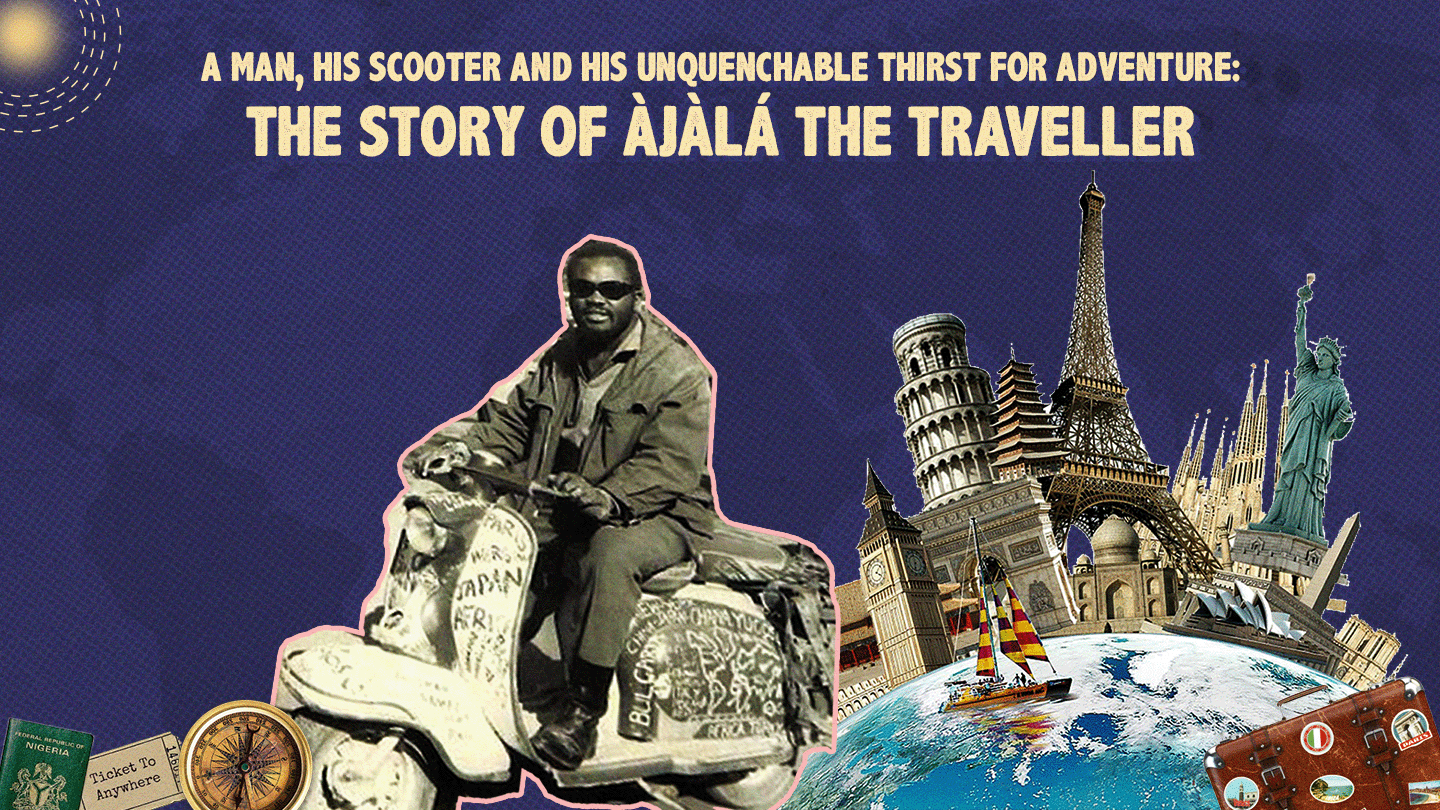If you’re a Nigerian who enjoys the occasional globetrotting, there’s a good chance you’ve been called ‘Ajala the traveller’, or just ‘Ajala’, before. The tag has stood the test of time in Nigerian lingo, from our parents’ generation to ours, even cutting across ethnic divides. Any Nigerian with wanderlust can be dubbed an Ajala. But who exactly was Ajala and how did he become such a household name? Let’s dive into the intriguing story of Olabisi Ajala.

From Medicine to the Open Road
Before there was Pelumi Nubi or Kunle Adeyanju, there was Olabisi Ajala, the man who toured over 80 countries on a Vespa scooter back in the 1950s. Born in Ghana and raised in Nigeria, Ajala relocated to the US to study pre-medicine at the University of Chicago at the age of 18. However, now in the Land of Dreams and Opportunity, Ajala soon realised he wasn’t made for a life confined to the four walls of a classroom, but a life on the road.
On 12 June 1952, a 20-something Ajala decided to embark on a cross-country trip from Chicago to Los Angeles on only ‘a radio-equipped English-style bicycle’. He journeyed for 28 days, covering 2,280 miles over 11 cities and grabbing America’s attention along with him. Along the way, he stopped in various cities to deliver lectures dispelling stereotypes that Africans ‘go about nakedly in loincloths.’ When he finally arrived in Los Angeles, he was received by then Mayor Fletcher Bowron.

Ajala’s life was quite the adventure, both on and off the road. Riding on the wave brought on by his bicycle voyage, he had a brief stint in Hollywood. Most notably, he featured in the 1953 motion picture White Witch Doctor, for which he was paid $300 (worth over $3,000 today) per week of filming. This was a huge jump from the $82 cash assets he reportedly had at the onset of his bicycle tour.
However, following a series of clashes with the American immigration authorities, Ajala was sentenced to a one-year suspended jail term. He was ordered to be deported to Nigeria, but he dramatically protested it by threatening to jump off an 80-foot radio tower. He ended up falling from a height of 16 feet, sustaining some injuries. Nevertheless, the authorities deported him, but only across the pond to England. This was likely due to Ajala’s claim that his father would kill him if he returned to Nigeria.
The Vespa World Tour
In 1954, Ajala returned to the US, but it wasn’t until 1957 that he decided to go on his famed world tour. This time however, he stepped up his travel gear to a motorised vehicle, a Vespa scooter—though some sources report that it was a Lambretta scooter. In ‘The Safari’ as he called it, Ajala set out to cover 30,000 miles across 40 countries over a period of 9 months. Instead, he ended up visiting 87 countries over 6 years.
Ajala and his rugged scooter made it to India, the Soviet Union, China and even as far as Australia. In India, he covered 6,500 miles from Amritsar to Bombay (Mumbai), traversing the remotest of villages. In Iran, Ajala travelled 950 miles from Maku to Tehran, where he observed an abundance of American products and stunning architecture.
Ajala’s bright-coloured scooter, with its graffiti and mementos from its charted territories, resembled the sticker-decorated danfos and kekes of Lagos. His agbadas were another worthy travel companion. Ever the cultural ambassador, he donned the Yoruba regalia—which foreign press described as ‘elaborately flowered robes’—in each country he visited.
Journalism on the Move
Ajala’s audacious travels earned him immense recognition and access to world leaders like India’s Jawalharlal Nehru, Israel’s Golda Meir, the Soviet Union’s Nikita Khrushcev and Nigeria’s Abubakar Tafawa Balewa. Few could claim, as Ajala did, that the Prime Minister of India had ridden their scooter.

Ajala leveraged his growing exposure to launch a career in journalism. In fact, Olabisi Ajala could be described as one of the pioneers of travel journalism in Nigeria. He sold his travel articles for publication in newspapers and magazines across West Africa and beyond, earning a substantial living.
But it was his memoir, An African Abroad (1963), about his multitude of travel experiences that was his magnum opus. Ajala narrated the most thrilling of encounters: arrests in the Middle East and Europe; bullet dodging in Sydney; visits to grounds previously uncharted by the Black man and the accompanying racism. Through his memoir, he showed that he was more than just a crazed traveller, but also someone who possessed a deep appreciation for global affairs and local politics.
He negotiated his way through borders of war-torn regions, spoke with Nigerian students in Russian universities about the immigrant experience, and enlightened people about the plight of Australian aboriginals and Palestinian refugees. It’s safe to say that Ajala’s mobility was driven by an intense curiosity about the human condition in its entirety. In a 2022 interview with Punch newspaper, Ajala’s son Femi Ajala attested to this, saying:
‘My impression now looking back on dad’s career was that he was a very deep-thinking, caring writer and publicist. The way he approached a story always seemed to have a human perspective. He was always trying to truly understand what human emotions, impacts, thoughts and feelings lie behind a story.’
Ajala also had a tendency for spreading his seed wherever he went, earning him the title ‘father of many nations’. He married five women from Australia, America, Britain and Nigeria and fathered children with many more.
In 1953, an American nurse named Myrtle Basset had his first son, Oladipupo, though Ajala initially contested the paternity. His marriage with American model Hermine Aileen only lasted a year as she divorced him on grounds of infidelity in 1955. One could say that Ajala, born into a polygamous home with 30 children, simply followed in his father’s footsteps.
Back to Base
Ajala later returned to Nigeria and got into show business as a publicist. His exploits landed him mentions from Yoruba music royalty like Chief Ebenezer Obey, Ayinde Barrister and King Sunny Ade. Even if the masses had not read his stories or books, they surely would have heard of a certain Ajala who ‘travelled all over the world’ in Obey’s 1972 hit album Board Members.
However, Ajala’s last days were far from glorious. Accustomed to a lavish lifestyle, he squandered most of the wealth he had amassed over the years. He barely had any savings and lived in a miserable rented apartment in Bariga.
On 2 February 1999, Olabisi Ajala, the globetrotter who had dined with world leaders from Africa to Asia, died a poor man in a general hospital in Lagos. Nonetheless, nearly 26 years later, Ajala’s name remains synonymous with adventure and wanderlust in Nigerian culture. His legacy lives on, through his progeny scattered across the globe, his writings and his unforgettable name.










